|
Limitar tu búsqueda
[+–] Compilador o editor
[+–] Editorial
[+–] Fecha
[+–] Formato
[+–] Idioma
[+–] Tipo de documento
[+–] Tipo de recurso
[+–] Classification
|

|
|
Financing universal enrollment to social health insurance: lessons learned from Colombia
The paper discusses the financing of the health care reform implemented in Colombia since the early nineties and explains the obstacles faced on the way to universal enrollment to social health insurance. The paper describes the reform and the sources created for its financing. It presents the observed trends in the financing of the insurance schemes created by the reform, identifies the...
|
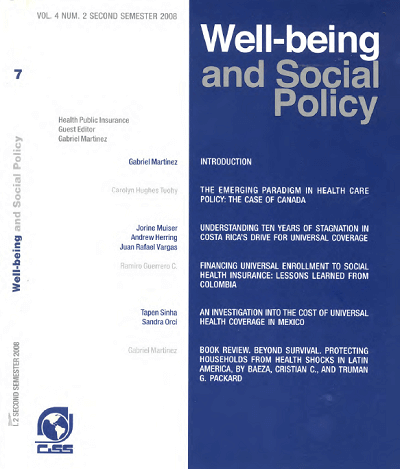
|
|
|
|

|
|
Understanding ten years of stagnation in Costa Rica's drive for universal coverage
This study analyzes achievements and obstacles in the process of moving towards universal coverage of essential health care services in Costa Rica. It describes the country as exemplary in the region, both in terms of population health status as well as health financing indicators. Life expectancy and the level of pre-payment are both comparable to high income countries. However, the process that...
|
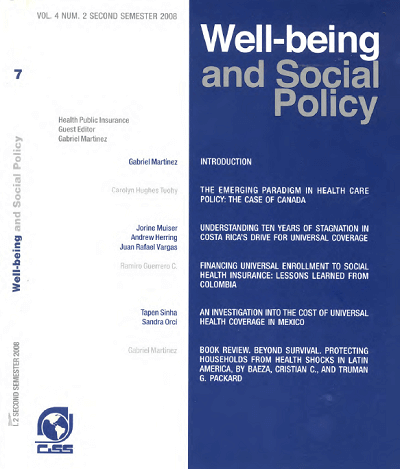
|
|
|
|

|
|
Introduction (on the subject that is addressed in the issue number)
In this issue of Well-being and Social Policy we have tried to include articles that support the debate around social insurance in health. This is an issue in which simple answers are hardly ever found, and a long term effort is required to understand the idiosyncrasy of each country and the best mix of regulation and financing options. Additionally, the studied cases point out to the need of a...
|
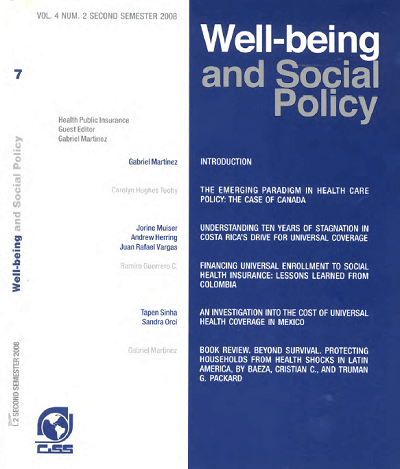
|
|
|
|

|
|
Book review. Public policy for an inclusive growth, edited by Pablo Cotler
The book “Public Policy for an Inclusive Growth” (The book) is an opportune and fortunate document. It is opportune because it is presented at a time in which public policy topics are subject to a wide debate in Mexico, and the discussion is fed with diverse points of view, theoretical and political, from which it is the purpose to analyze, design, redesign, implement, and evaluate the government...
|
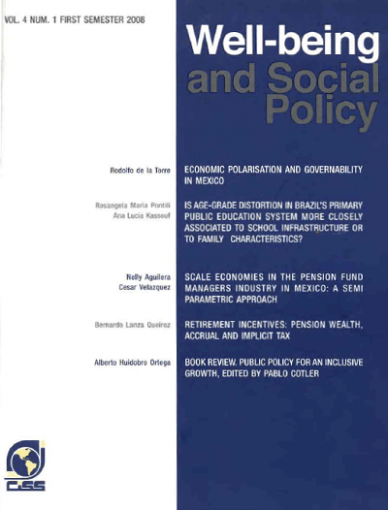
|
|
|
|

|
|
Scale economies in the pension fund managers industry in Mexico: a semi parametric approach
It has been widely accepted that reforms on pension schemes have led to improvements in the financial viability of the systems. Nevertheless, at the same time it has been shown that fees charged by pension fund managers (PFM) are very high, implying high mark-ups for them and lower expected pensions for the participants. The presence of economies of scale has been suggested as one main reason for...
|
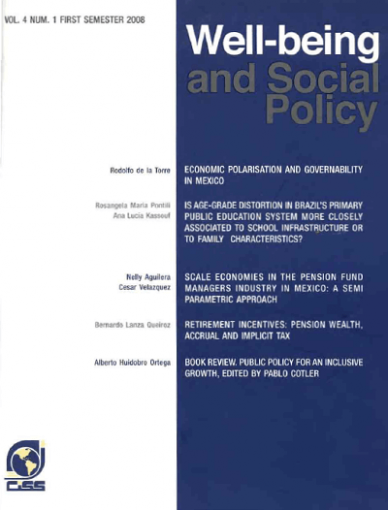
|
|
|
|

|
|
Is age-grade distortion in Brazil's primary public education system more closely associated to school infrastructure or to family characteristics
Different economic studies have shown the importance of education in improving the quality of life of individuals. Thus, in the 90’s, the public education system was reformed to enhance the quality of public education in Brazil and motivate student interest. This paper participated in this discussion by suggesting an assessment of the impact that school infrastructure and family characteristics...
|
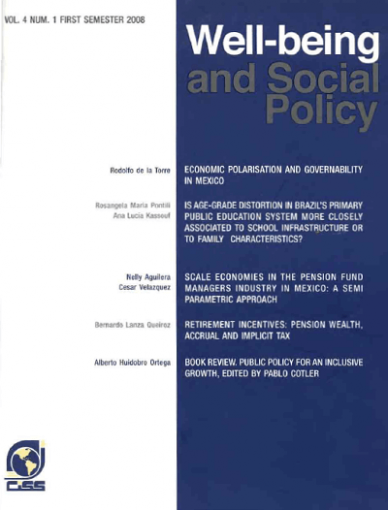
|
|
|
|

|
|
Diversity and equity: Review to indigenous peoples, poverty and human development in Latina America: 1994-2004, edited by Gillete Hall and Harry A. Patrinos
The evolution of specific welfare-related indicators for these indigenous populations during the last decade is the theme of this important book. The study declares to have four guiding questions,
to wit:
1. Have income poverty rates increased or decreased among Indigenous Peoples over the past decade, and what are the main determinants of observed trends?, How does this evolution compare to...
|
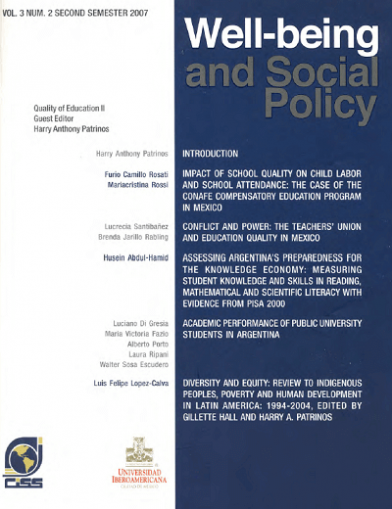
|
|
|
|

|
|
Book review. Beyond survival. Protecting households from health shocks in Latina America, by Baeza, Cristian C., y Truman G. Packard
The book by Cristian Baeza and Truman Packard is based on the next hypothesis: adverse health events reduce the consumption of goods and services different from health services, and many households become poor because of that. While the authors recognize that the evidence they present on the topic is limited, they propose the use of a “universal risk pool” as a way to eliminate the problem of...
|
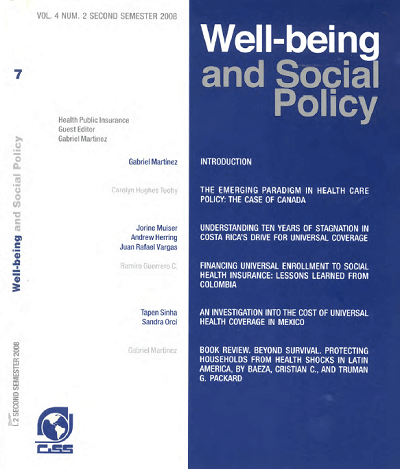
|
|
|
|

|
|
Academic performance of public university students in Argentina
Designing educational policies under limited budgets requires a thorough analysis of the impact of alternative factors on student performance. This work aims at providing an analysis of the relationship between university performance and its explanatory factors. The analysis Will focus on the Argentinean case, using the 1994 Census of Students in National Universities, which includes data on all...
|
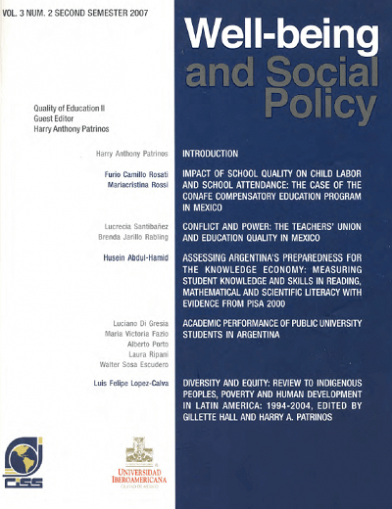
|
|
|
|

|
|
Assessing Argentina's preparedness for the knowledge economy: measuring student knowledge and skills in reading, mathematical and scientific literacy with evidence from PISA 2000
The results of 2000 study of the Programme for International Student Assessment (PISA) show that while Argentinean students performed similar to their peers in most other Latin American countries, they lagged behind all OECD and most of other participating countries. Attention needs to be given to further master the reading, math and science skills that are needed for a knowledge economy; and...
|
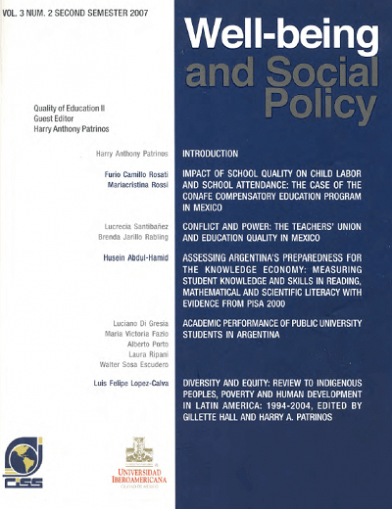
|
|
|
|

|
|
Conflict and power: the teachers' union and education quality in Mexico
The teachers union in Mexico, or Sindicato Nacional de Trabajadores de la Educación (SNTE) represents over 1 million members and is the largest in Latin America. This study uses data from the national student tests administered by the Instituto Nacional para la Evaluación de la Educación (INEE), along with data from the Mexican Ministry of Education and other sources, to investigate the...
|
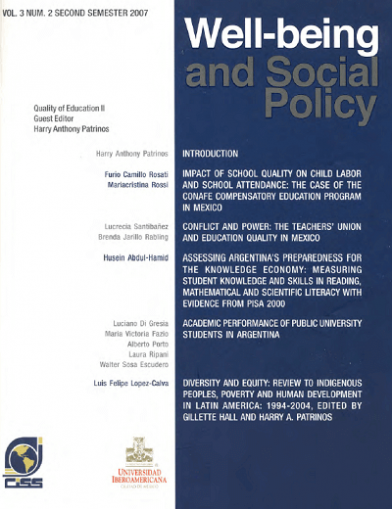
|
|
|
|

|
|
Impact of school quality on child labor and school attendance: the case of the CONAFE compensatory education program in Mexico
This paper focuses on the impact that two different types of policy interventions, namely enhancing school quality and contingent cash transfers, have on child labor and school attendance in Mexico. While there are many studies on the impact of Oportunidades on schooling outcomes, little evidence is available on whether school quality programs such as CONAFE also reduce child labor and help keep...
|
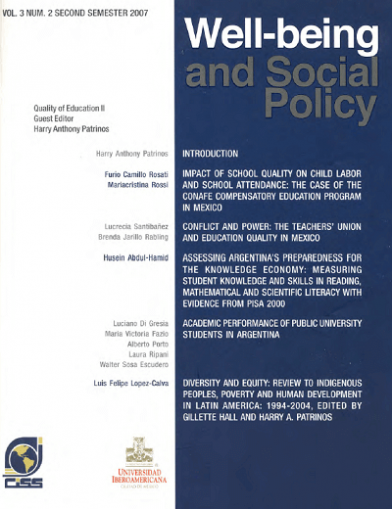
|
|
|
|

|
|
Introduction (about the internatinal conference on "The quality of education in Latin America and the Caribbean")
The Inter-American Conference on Social Security (CISS) and Universidad Iberoamericana (UIA) co-hosted an international conference on "The Quality of Education in Latin America and the Caribbean" in February 2007. The conference examined the quality of education in the region, the determinants of learning, policy and program evaluation, and the impact of quality of education on the labor market....
|
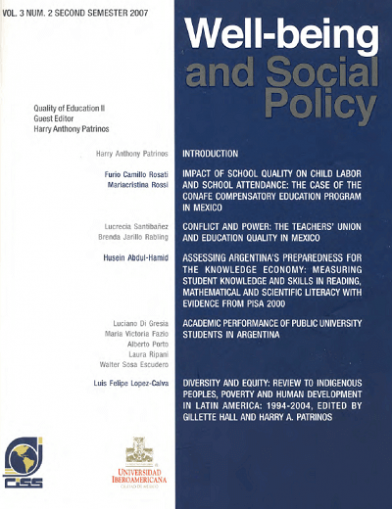
|
|
|
|

|
|
Book review. Improving the quality of education in Mexico: Positions and proposals, edited by Francisco Miranda, Harry Patrinos y Ángel López
This book gathers analyses performed by several authors on policies considered appropriate by the World Bank to enhance the quality of basic education provided in Mexico, in particular, education received by majority sectors in our society (World Bank: 2005).
|
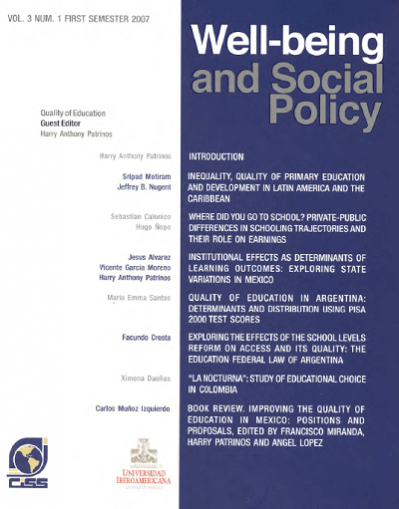
|
|
|
|

|
|
"La Nocturna": study of educational choice in Colombia
This study uses data from Colombia’s 2003 Encuesta de Calidad de Vida to examine how well do electricity strata (proxy for socioeconomic status) explain the choice decision for type of institution and session attended. In the model of choice by type – private vs. public universities – I find that as the electricity strata increases, the marginal probability of enrolling in a public university...
|
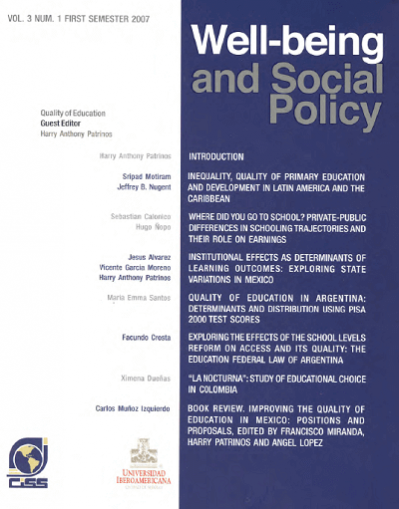
|
|
|
|

|
|
An investigation into the cost of universal health coverage in Mexico
The Mexican social security system, after operating for over six decades, has managed to provide healthcare for slightly over half the resident population.
There are wide geographical and socioeconomic variations in coverage. To provide wider coverage, the Federal Government created the Sistema de Protección Social en Salud (SPSS) for covering low income family. It becomes the third...
|
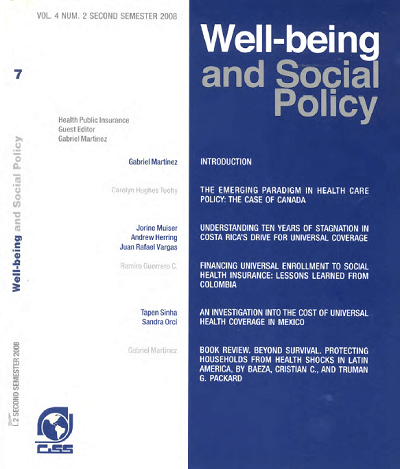
|
|
|
|

|
|
Financial development and the distribution of income in Latina America and the Caribbean
One of the central concerns in Latin America an the Caribbean (LAC) has been the reduction of poverty and inequality so prevalent in the continent. Using large world samples, the literature has found that financial development increases economic growth, increases the income of the poor, and reduces inequality. This paper studies the effects of financial development on the whole distribution of...
|
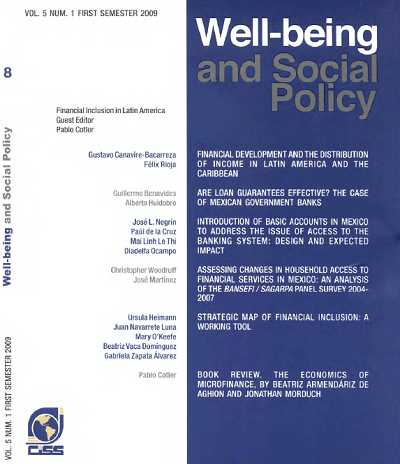
|
|
|
|

|
|
Economic and socio-demographic determinants of crime in Uruguay
This study estimates a panel data model to analyze the economic and socio-demographic determinants of crime in Uruguay across the 19 Uruguayan departments in the period 1986-2006.
This research has two components: i) to present a systematic analysis of the Uruguayan crime data and socio-economic and demographic characteristics of the population, and ii) to evaluate the empirical significance...
|
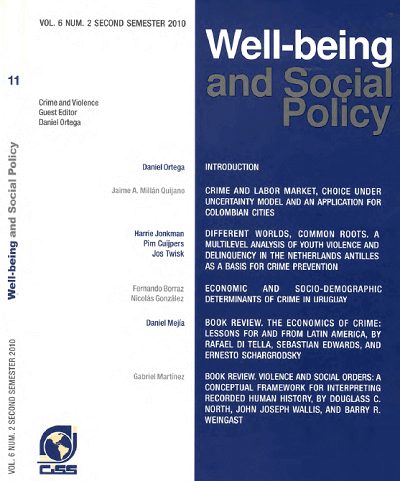
|
|
|
|

|
|
Hurricane Mitch and consumption growth of nicaraguan agricultural households
There is little micro-evidence on the persistence of natural disasters' welfare impacts. This paper assesses the effect of Hurricane Mitch on consumption of Nicaraguan agricultura) households. Mitch occurred in October 1998. Pre-post data is obtained from a nationally representative panel collected in 1998 and 2001. An additional survey was fielded in 1999 for households from the panel affected...
|
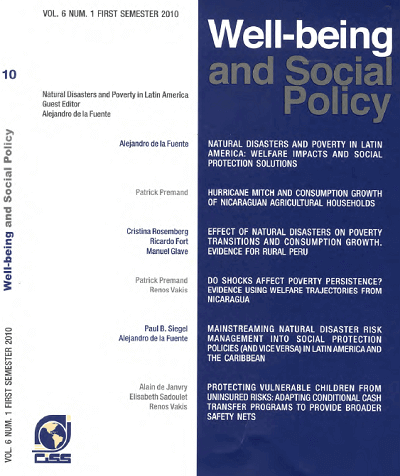
|
|
|
|

|
|
Different worlds, common roots a multilevel analysis of youth violence and delinquency in the netherlands antilles as a basis for crime prevention
Most research on the prevalence, determinants, and variations of violence and delinquency among youngsters is conducted in Western societies. This multilevel study is set in the Netherlands Antilles (NA) and aims to build up prognostic multilevel models as a basis for targeted crime prevention in a non-western area. Data were collected from a sample of adolescente in the NA. Non-hierarchical and...
|
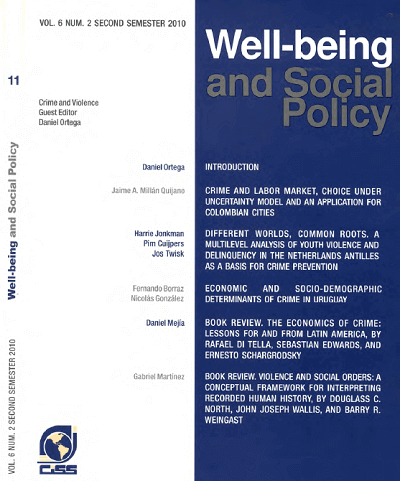
|
|
|
|
|